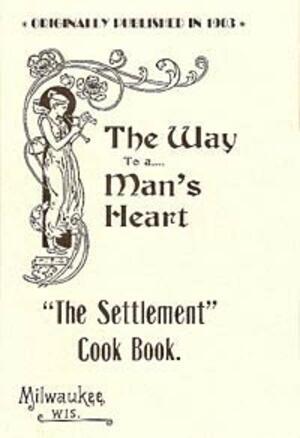"Settlement Cookbook" author Lizzie Black Kander is born
Courtesy of the Wisconsin Historical Society.
Lizzie Black Kander, author of The Settlement Cookbook, was born in Milwaukee, on May 28, 1858. Like many middle-class Jewish women of her time, she was deeply involved in Progressive Era reform movements that sought to aid and Americanize immigrants. Kander first became involved in local reform efforts in 1878, when she joined Milwaukee's Ladies Relief Sewing Society. Under Kander's leadership, the Society evolved into the Milwaukee Jewish Mission. It was as president of "the Settlement," Milwaukee's first settlement house, a multi-purpose reform organization modeled on Jane Addams's Hull House, that Kander made her most lasting contribution.
Among the Settlement's programs was a series of cooking classes for immigrants. In 1901, Kander asked the Settlement's board for $18 to print a small booklet of recipes for her students. When the board refused, she raised money from the local business community and produced the first edition of The Settlement Cookbook, which combined her recipes with instructions on cleanliness and food storage and general housekeeping tips. The first edition of the Cookbook was published on April 30, 1901. By 2004, The Settlement Cookbook, still in print, had gone through 40 editions and sold over 1.5 million copies, making it the most successful American Jewish charity cookbook of all time.
The royalties from the cookbook, which reached $50,000 by 1925, were used to support the activities of the Settlement, including hygiene classes, free baths, and sewing and English instruction. These activities reflected the dual aims of many progressive-era reform projects: to help immigrants integrate into American culture both through practical instruction in English and by introducing them to American norms of cleanliness and nutrition that were considered superior to immigrant culture. While sometimes patronizing and ethnocentric, these efforts helped many immigrant families to survive their first years in a new country when jobs and money were often in short supply. Cookbook sales paid for the construction of the Abraham Lincoln Settlement House in 1910 and the Jewish Community Center of Milwaukee in 1931.
Kander's community involvement stretched beyond the Settlement. During World War I, she headed Milwaukee's Food Conservation Council, teaching immigrants how to conserve food. During the Great Depression, she established one of the first food exchanges in the country, employing women to cook large quantities of food that were then sold at a low price. She also wrote a regular cooking column for the Milwaukee Journal. From 1909 to 1919, she served on the Milwaukee school board, helping to establish the Girls Technical High School to provide vocational training to young women. In 1939, Wisconsin honored her as one of the state's outstanding women. Kander died on July 24, 1940. The Settlement Cookbook is still in print.
Sources: Jewish Women in America: An Historical Encyclopedia, pp. 717-718; Wisconsin Magazine of History, Spring 2004, pp. 36-49; New York Times, July 26, 1940, September 5, 1965.



